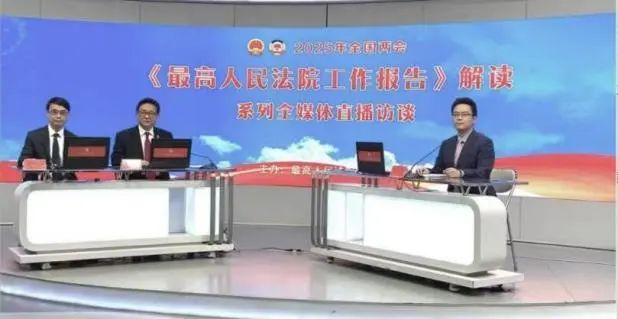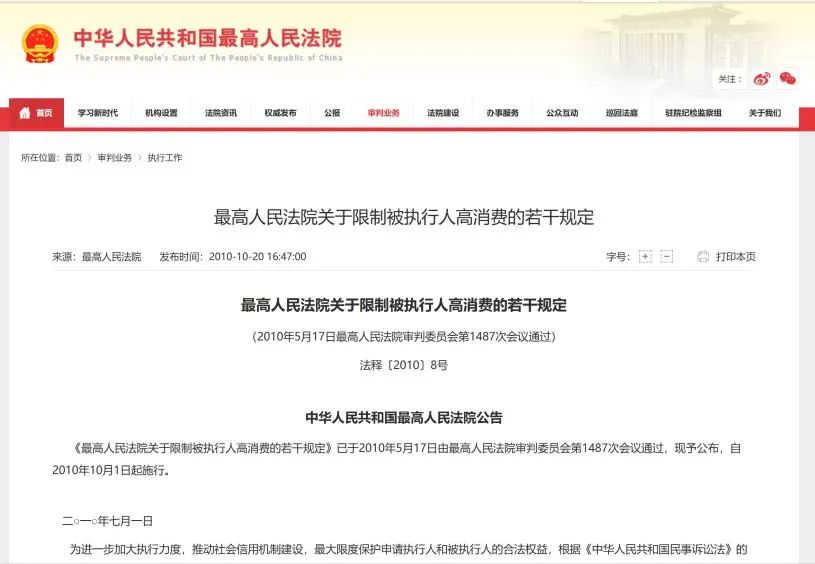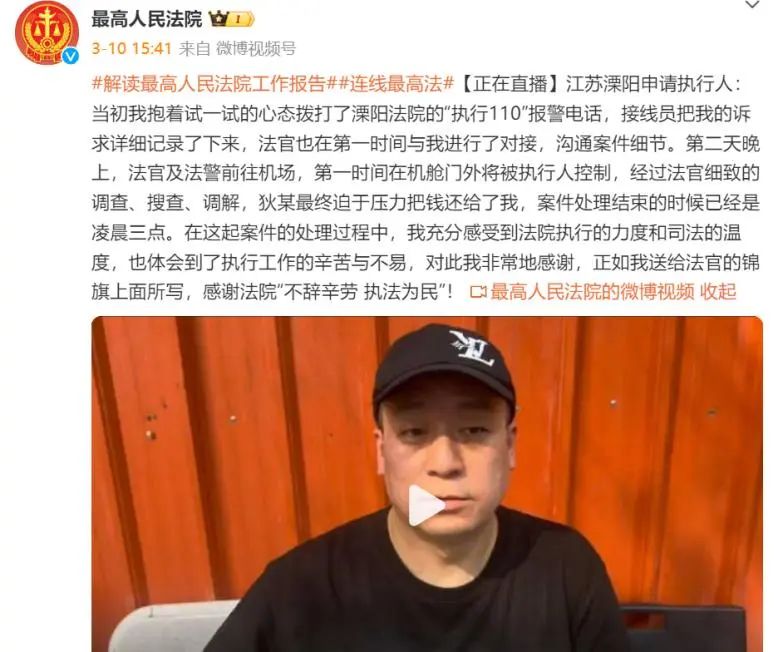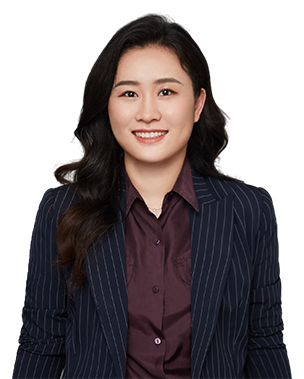New Measures for Punishing "Dishonesty" by the Supreme People's Court at the Two Sessions in 2025 (Part 3): "Height Limit" Single Release Mechanism
On March 10, 2025, Huang Wenjun, Director of the Executive Bureau of the Supreme People's Court, made this statement in a series of live interviews with all media outlets during the interpretation of the "Work Report of the Supreme People's Court" at the Two Sessions, and introduced the new measures of the People's Court in the field of dishonesty punishment - promoting the classification and grading of dishonesty punishment, establishing grace periods, and a single lifting mechanism.

1、 What is the system of restricting high consumption?
At the beginning of the 21st century, with the development of the economy, there was an increase in dishonest behavior. Debtors concealed their assets and high consumption but refused to repay, seriously damaging the authority of the judiciary. The Supreme People's Court issued the "Several Provisions of the Supreme People's Court on Restricting High Consumption of Persons Subject to Enforcement" in 2010, establishing a system for restricting high consumption. The system of restricting high consumption in the execution of the people's court refers to the measures taken by the executing court to restrict the high consumption and non essential consumption of the executed person who fails to fulfill the payment obligation determined by the effective legal document within the period specified in the execution notice.


2、 What is the mechanism for lifting restrictions on high consumption single transactions?
Due to the serious illness of the executed person or their close relatives seeking medical treatment, the funeral of their close relatives, as well as the urgent need to travel to other places while performing or cooperating with official duties, participating in foreign affairs activities or important exams, the height limit can be lifted, but the maximum temporary lifting period shall not exceed one month.
The single unlocking mechanism, which is a "precise unlocking" mechanism, not only avoids excessive restrictions on citizens' basic survival needs, but also prevents execution loopholes through approval procedures, achieving a balance between punishment and survival rights.
The Opinions of the Supreme People's Court on Further Strengthening the Concept of Good faith and Civilized Execution in Execution Work, implemented on December 16, 2019, 17. Several situations for lifting restrictive consumption measures. After the people's court takes measures to restrict the consumption of the person subject to enforcement, if the person subject to enforcement and its related personnel apply for lifting or temporary lifting, they shall be dealt with according to the following situations:. The above-mentioned personnel shall submit sufficient and effective evidence and make written commitments as required when applying to the people's court; If false evidence is provided or consumer behavior is engaged in in violation of commitments, the people's court shall promptly restore the restrictive measures taken against them, and at the same time, impose heavier punishment in accordance with Article 111 of the Civil Procedure Law, and reject their application again.
3、 Case study on the mechanism of restricting high consumption single unlocking
As in the case of Baoquanling People's Court in Heilongjiang Province, Li (pseudonym) was included in the list of dishonest persons subject to enforcement and restricted from high consumption. Due to health issues, Li is currently undergoing temporary release from prison. They need to go to a designated medical institution for physical condition assessment and examination, but their place of residence is far away from the designated medical institution, and ordinary transportation takes a long time, which their body cannot bear. They hope to take a plane to the designated city. The 'height restriction order' is like a 'tight spell', making it impossible to take airplanes and high-speed trains. For this reason, Li hopes to lift the restriction on high consumption in one go. The law enforcement officers carefully verified the relevant situation and confirmed that the information reported by Li was true. According to the law, it is possible to temporarily lift the restrictions on high consumption measures. After comprehensive analysis and approval from the hospital leadership, the enforcement officers quickly processed a single lifting of the "height limit order" and explained to Li again: "The lifting of the 'height limit order' this time is temporary, and in the future, we should actively pay fines in order to open the 'convenient door' for ourselves

During the two sessions in 2025, the work report of the Supreme People's Court announced an enforcement case in Liyang Court, Jiangsu Province: after the court ended this enforcement procedure, the person subject to enforcement, Mr. Di, applied for lifting the "height limit" measure on the ground that he had bladder cancer and needed to go to Beijing for treatment. After verifying the authenticity of the medical condition, the court lifted the restriction and warned them to fulfill their obligations. In 2024, it was discovered that Di had repeatedly gone to Hong Kong and Macau for high consumption and gambling, and made large expenditures through other people's accounts. The court, in collaboration with the public security, arrested Di at the airport and seized branded cigarettes, alcohol, and Hong Kong dollars in cash at the scene. Di admitted to evading enforcement actions and fully fulfilling them, but due to fabricating the reason for lifting the "height limit" and engaging in luxury consumption, the court transferred the clues of refusal to execute to the public security organs for investigation.


In summary, the mechanism of restricting high consumption single unlocking has been implemented for nearly 5 years. As a judicial practice that balances "punishment and deterrence for dishonesty" and "humane relief", it was particularly emphasized in the 2025 Supreme People's Court Work Report of the Two Sessions. The report of the two sessions highlights the balance between "dishonesty punishment" and "good faith civilization" in the enforcement system through the typical case of "high consumption after a single lifting of the ban by Di in Liyang". It not only avoids the damage to the basic human rights of the executed person caused by the "one size fits all" height limit, but also conducts a strict review of the reasons and evidence for a single lifting of the ban on a case by case basis. Afterwards, by holding accountable for "providing false evidence or violating commitments to engage in consumption behavior", it strictly prevents the abuse of power and provides a model for building a modern enforcement system that combines rigidity and flexibility.
Related recommendations
- Can I get a tax refund if my bet fails? ——Comment on the case of Wang and Shanghai Taxation Bureau's refusal to refund taxes
- How shareholders can withdraw their shares Series 2: Company merger, division, or transfer of major assets
- From the Xiao incident to see the complex impact of spousal reporting - a double-edged sword in divorce proceedings
- Analysis of Criminal Legal Risks in Low altitude Economy and Preliminary Exploration of the Road to Criminal Compliance in Low altitude Economy



